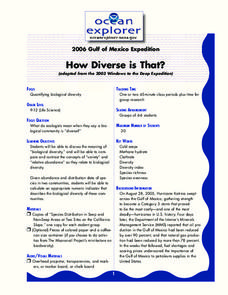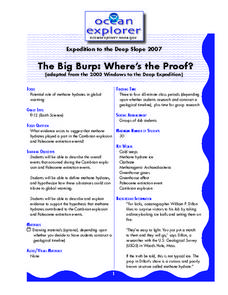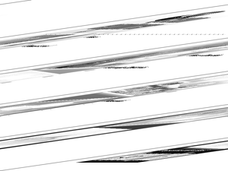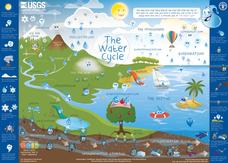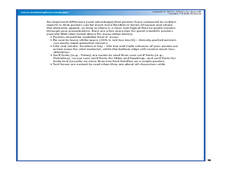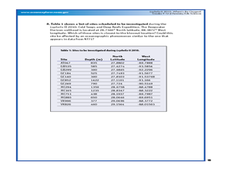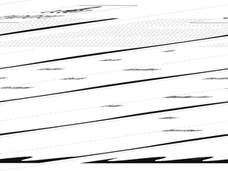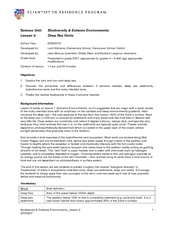Curated OER
How Diverse is That?
Students discuss biological diversity in ocean communities. In this diversity activity, students examine the variety of organisms compared to relative abundance. They will write an analysis and discuss their findings with the class.
Curated OER
Exploring Explorations-Ocean Exploration
Students learn about Earth's deep ocean discoveries and their benefits. In this ocean exploration lesson, students review previous explorations of the Earth's deep oceans and learn about the discoveries of the past.
Curated OER
The Big Burp: Where's the Proof?
Students research the evidence for prehistorically formed methane hydrates contributing to global warming. In this climate change lesson plan, students work in groups to research methane hydrates, global warming, The Cambrian Explosion,...
Curated OER
Exploring Explorations
High schoolers describe human benefits from ocean exploration. In this ocean exploration lesson plan, students focus on the historical, biological, and physical features of the deep oceans and man's exploration.
Curated OER
Reduced Fare
Students discover the relationship between tectonic plate boundaries and the communities of life that thrive at such boundaries. In this biology lesson, students find that methane from oxidized carbon in sediments provides nutrients for...
Curated OER
Animals of the Fire Ice
Students examine ocean life by identifying methane hydrates. In this ocean life lesson, students research organisms that live in the coldest, deepest parts of the ocean and live off methane hydrates. Students create a group...
US Geological Survey
Water Cycle Poster
How many parts make up the water cycle? How many things on Earth rely on water as a system? Learn more about the water cycle in an informative and colorful poster. Print and hang, or project the graphic in the classroom for optimal use.
Curated OER
The Water Cycle
An inventive and interesting lesson on the water cycle (and other cycles associated with it), is here for you. After doing a well-designed hands-on inquiry in class, learners also identify organisms and processes that are involved in the...
Calvin Crest Outdoor School
Survival
Equip young campers with important survival knowledge with a set of engaging lessons. Teammates work together to complete three outdoor activities, which include building a shelter, starting a campfire, and finding directions in the...
Curated OER
What's So Special?
Young scholars study the biology and morphology of Lophelia corals. In this investigative lesson students explain how the coral contributes to communities, and create a poster.
Curated OER
From the Gulf of Mexico to the Moons of Jupiter
Students compare deep ocean conditions to those found on the moons of Jupiter. In this Earth science lesson, students consider the possibilities and conditions needed to support simple life. Students examine the habitats and life found...
Curated OER
Let's Make a Tubeworm!
Students discuss deep-sea chemosynthetic communities then create a poster of a three-dimensional tubeworm. In this creative lesson students create their own tubeworm and write a written report on it.
Curated OER
Where's the Oxygen?
Young scholars study seawater and how temperature and salinity influence it. In this oxygen activity students complete a lab activity on dissolved oxygen.
Curated OER
How Diverse is That?
Learners study the concepts of "variety" and "relative abundance" as they relate to biological diversity. In this life science lesson students calculate numbers that describe the biological diversity in certain communities.
Curated OER
Cool Corals
Students explore corals and polyps. In this coral reef instructional activity students divide into groups and prepare a written report.
Curated OER
The Big Burp:A Bad Day in the Paleocene
Students describe the overall events that occurred during the Paleocene extinction event as well as the processes that are believed to result in global warming after group research. They infer how a global warming event could have...
Curated OER
What is a Karst?
Students examine the process that creates limestone. In this limestone lesson plan students complete a worksheet and participate in a lab activity.
Curated OER
Chemosynthesis in the Classroom
High schoolers observe the development of chemosynthesis in bacterial communities. In this bacteria lesson students explore that chemosynthesis is and how it is relevant to biological communities.
Curated OER
The Big Burp: Where's the Proof.
Students explore the Cambrian explosion and Paleocene extinction events. In this climate change lesson, students read articles to link evidence they find to extinction and climate change. Links to the articles are included in the lesson.
Curated OER
Deep Sea Vents
Learners study the vent and non vent deep sea and see the differences in habitats. In this investigative lesson students complete a worksheet and work in groups.
Curated OER
Advanced Synonyms and Antonyms- Multiple Choice- Verbs 3
In this synonyms and antonyms worksheet, learners choose the best synonyms from 5 choices for 6 words. Students then choose the best antonym for 6 more words.
Curated OER
Pollution Solution
Students explore the concept of environmental stewardship. In this science instructional activity, students investigate the effects of oil spills and brainstorm ideas to help companies avoid them as they create models to demonstrate...
Curated OER
This Old Tubeworm
Students explain the process and significance of chemosynthesis. They develop their own graphic based on data of a biological community. They estimate the age of a given species as well.
Curated OER
The Water Cycle
Fifth graders identify organisms and processes involved in three cycles: the water cycle, the carbon cycle, and the nitrogen cycle. They produce a pictorial or abstract water cycle, and appropriately place life forms onto an existing...


